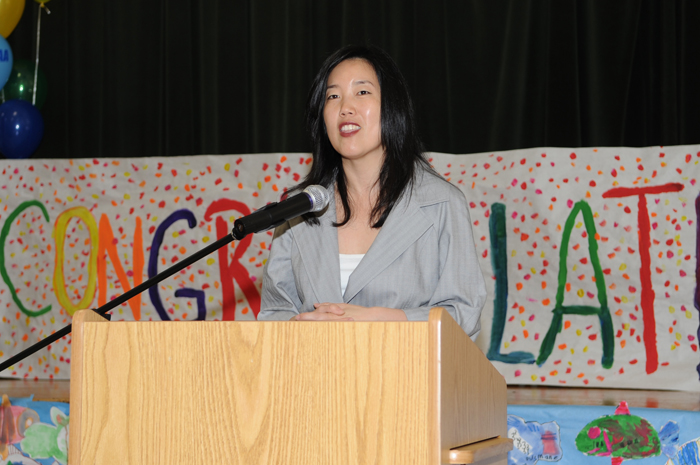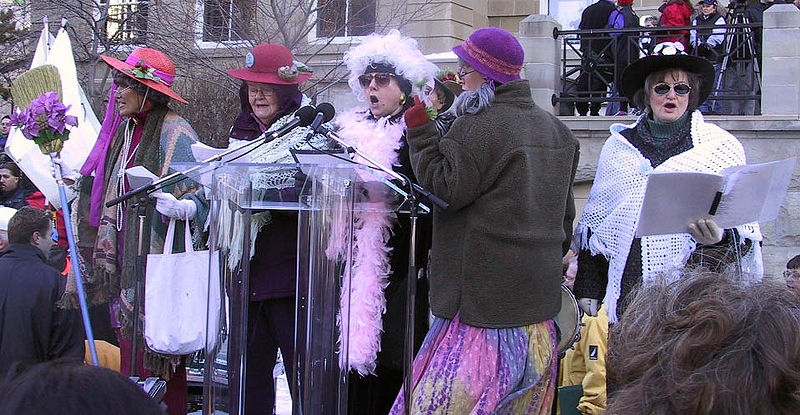 On Friday, July 23, Michelle Rhee, Chancellor of Washington D.C. Public Schools, dismissed teachers across the city for poor performance. The number of teachers dismissed has yet to be finalized, but at one point, figures were pointing to as high as 240. Other teachers have been placed on probation, and must prove themselves worthy of the high standards Rhee has set for them. She even went so far as to tie teachers’ pay to their performance when negotiating with the Washington Teacher's Union. As a British citizen, I couldn't help but think whether Rhee was taking inspiration from the Iron Lady herself, AKA, Margaret Thatcher - Britain's first female prime minister, who fought many battles against the unions. Whatever the source of Rhee's inspiration, this was an unprecedented step to take. Some may posit that she is addressing what is called, "the widget effect" - the failure to act on differences in teacher effectiveness.
On Friday, July 23, Michelle Rhee, Chancellor of Washington D.C. Public Schools, dismissed teachers across the city for poor performance. The number of teachers dismissed has yet to be finalized, but at one point, figures were pointing to as high as 240. Other teachers have been placed on probation, and must prove themselves worthy of the high standards Rhee has set for them. She even went so far as to tie teachers’ pay to their performance when negotiating with the Washington Teacher's Union. As a British citizen, I couldn't help but think whether Rhee was taking inspiration from the Iron Lady herself, AKA, Margaret Thatcher - Britain's first female prime minister, who fought many battles against the unions. Whatever the source of Rhee's inspiration, this was an unprecedented step to take. Some may posit that she is addressing what is called, "the widget effect" - the failure to act on differences in teacher effectiveness.
"Waiting For Superman" Delivers A Message
Teacher unions have come under the spotlight from other angles. Davis Guggenheim, director of An Inconvenient Truth, recently unveiled his new film, Waiting for Superman, earlier this year at the Sundance Film Festival. It went on to take the Audience Award for Best US Documentary. The film is meant as a candid portrayal of the US public schooling system. It considers the role of unions and the leaders of these organizations. Conveying a message, the film shows that the two major teacher unions comprise the largest contributors to the Democratic Party.
More Questions than Clear Answers are Found in the Research
Teacher unions are powerful players in the developing world too. The Economist reported last year from Brazil that, "almost anything that disturbs their peace brings on strikes."
Sao Paulo's teachers went to strike over a proposal to make new recruits take tests before they start work to ensure they are qualified; last year they created a furor when the state government asked them to teach from standard textbooks. They opposed a plan to pay staff bonuses depending on their schools' performance, but surprisingly went silent since 70% of the state's teachers received a bonus.
In Chile, the anecdote of Jaime Gajardo is often recounted to good effect. When the Chilean government introduced teacher performance evaluations for the first time.
Gajardo was the first teacher who lost his job in the crackdown. He then took up leadership of the largest teacher union in the country and set to work in getting the union to vote for the end of teacher performance evaluations.
Research on Teacher Unions in North America
 A 1996 paper by Caroline Hoxby at Stanford comes up frequently. Through district-level panel data from the 1972-1992 U.S. censuses, she used school district fixed effects to look at unions. She showed that: "the presence of a teachers’ union, as indicated by the existence of contracts combined with over 50% teachers’ union membership, increased average teacher pay by over 5% and [current] operating expenditures per student by almost 3%, while decreasing student-teacher ratios by 1.1 students. There is also evidence that unions increase high school dropout rates."
A 1996 paper by Caroline Hoxby at Stanford comes up frequently. Through district-level panel data from the 1972-1992 U.S. censuses, she used school district fixed effects to look at unions. She showed that: "the presence of a teachers’ union, as indicated by the existence of contracts combined with over 50% teachers’ union membership, increased average teacher pay by over 5% and [current] operating expenditures per student by almost 3%, while decreasing student-teacher ratios by 1.1 students. There is also evidence that unions increase high school dropout rates."
New Research From Three Midwestern States
Lovenheim provides a useful synthesis of the debate in his recent paper, “The Effect of Teachers’ Unions on Education Production: Evidence from Union Election Certifications in Three Midwestern States.” He used “data on the timing of teachers' union election certifications in Iowa, Indiana, and Minnesota, combined with school district-level data from the Census/Survey of Governments, and investigated the impact of teachers’ unions on school district educational resources."
Lovenheim found that in these cases:
- Unions have no effect on teacher pay.
- Teacher unionization causes an increase in full-time teacher employment of about 5%, a negligible decrease in student-teacher ratios, and only has a short-run positive effect on current operating expenditures per student.
- On estimating the impact of unions on high school dropout rates using 1970–1990 U.S. Census school district summary data, there is little evidence that unions affect this outcome measure. However, he notes that he is unable to determine with his data whether similar results would be found for other achievement measures that include more students from higher portions of the ability distribution.
Given his surprising findings – though he cautions that his analysis is confined to the three Mid-Western states - he poses answers to the question:
“Why Do Teachers Bother to Organize?"
- Teachers perceive that organization increases their pay.
- Another important reason for unionizing is to give teachers a voice in a world where they feel increasingly under pressure.
- Finally, unionization may increase nonwage benefits such as pensions or health care that are valued by teachers.
No Simple Answer in the Research, but the Key is in Managing
Unions like all political-machines often have various and contradictory motives for existing and for both hindering and helping an education system. How to manage negotiations is really the key, especially in countries where unions are part of the political landscape. Under the Carrera Publica Magisterial in Peru (2006-2008), the government included tighter standards for many aspects of the teaching profession which were resisted by some in the unions initially. However through careful reform implementation and consultation, 10% of Peru's 300,000 teachers have attained these higher standards which hopefully, helps them to be more effective in the classroom. The unions had control of the process. Teachers acquired more skills. Peru's education system seems stronger for it. Everyone wins.
Photo credits - The first image ("This celebrating lady is "not for turning." Is Rhee taking inspiration from Margaret Thatcher?") and the second image (Alberta teachers protesting") come from Wikipedia Commons.


Join the Conversation